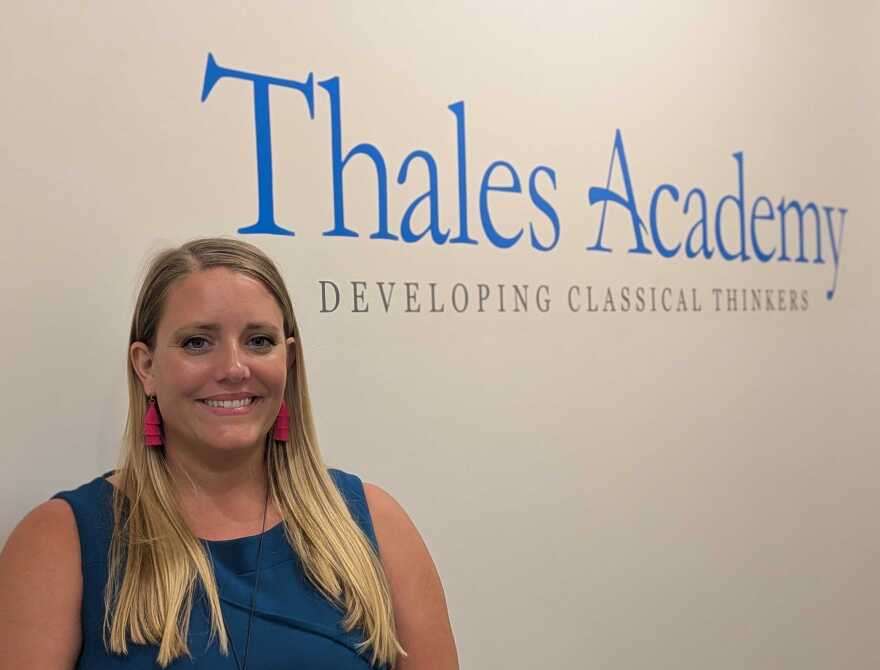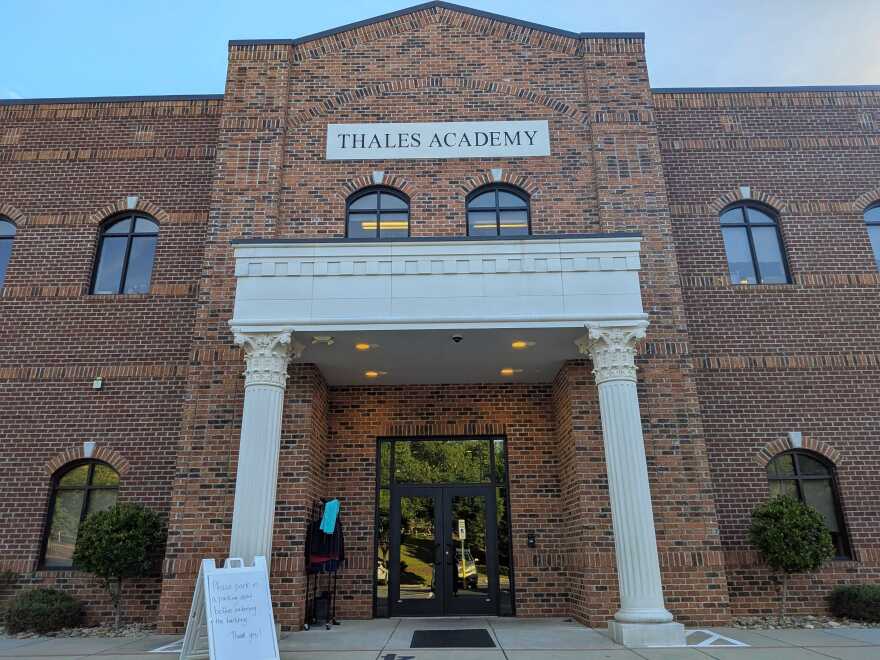Greek columns flank the front doors of Thales Academy Raleigh, tucked away in a diverse neighborhood on the northeast side of the city. Inside, the hallways are tidy and filled with murals of great scientists, mathematicians, and entrepreneurs.
In a second-grade class, the teacher leads a reading lesson. Students point to each word in their books as they read vocabulary aloud in chorus, "ancient… language… army!"
The day's reading is about the Trojan War. This private school is one of eleven Thales Academies in North Carolina, and all teach a classical curriculum with an emphasis on western civilization and teacher-led instruction.

Head of School Brittany Long said parents appreciate the structure and consistency, and at a tuition price of under $7,000 a year, it's more affordable than private schools, which count as competitors.
"Our motto is high quality and affordable costs," Long said. "Still with the rising cost of everything else, some families just could not afford to stay here."
Raleigh's rapid growth is driving up the cost of living in this neighborhood. You can see the signs. Down the road, a new apartment complex across from a Walmart is advertising three-bedroom units starting at $2,500 a month.
Long said in recent years, more families at the school have had trouble affording tuition for multiple kids. Then something changed last fall.
State lawmakers lifted the income cap for the state's primary school voucher program, known as Opportunity Scholarships. Now, families earning $111,000 or more for a family of four could apply for up to $4,328 per child to put toward their private school tuition.
Families attending private schools in Wake County took in more scholarship money than any other county. Of the $542 million the state legislature committed to Opportunity Scholarships this school year, more than 10% paid tuition for private schools in Wake County.
Long applied for the scholarships for her own three daughters who attend Thales Academy-Raleigh. After applying her employee discount, she said it was costing her family about $20,000 a year for all three to attend the school she leads. With an Opportunity Scholarship Tier 3 award, her family is saving $13,440 a year, or about the cost of tuition for two of her three children.
"We're able to not stress over that piece of our financial life," Long said. "We're able to take more family vacations, or maybe take them to a museum that we wouldn't be able to go to."
One reason more families were able to stay enrolled in Thales Academies last year is because the school's founder, Bob Luddy, gave parents the option to delay their tuition payments until the legislation to fund more Opportunity Scholarships passed late in the fall semester.
"Because Mr. Luddy knew it was coming down the pipe," Long explained. "So he was able to actually tell parents, 'Don't worry. We're going to defer tuition payments until X date when we think this is going to be passed.' "
Thales Academy's founder Bob Luddy has been a leader in private school growth
Luddy has advocated for Opportunity Scholarships since their inception more than a decade ago. He's a frequent donor to Republican candidates and causes in North Carolina. He’s also well acquainted with the original architect of the Opportunity Scholarship program, former Republican House Majority Leader Skip Stam, who now teaches a class at one of the Thales Academies.
Luddy said originally, his primary focus in supporting vouchers was to help students who couldn't afford private school.
"I probably didn't think long term about universal school choice, although I do think it's a very good thing," said Luddy, 79.

Universal school choice means that now any North Carolinian can receive thousands of dollars in state funding for private school tuition, even if they are a millionaire.
"They're paying taxes like everybody else," Luddy said. For him, the point of the vouchers is to give all families more options when it comes to their child's education.
"You think about the American way — it's about freedom and choice," Luddy said.
Of the 15 private schools in Wake County that received the largest increase in Opportunity Scholarship funding this school year, eight of them are Thales Academies.
But Luddy isn't profiting from the schools. Tax filings for the Thales Academy nonprofit show he draws no income from them. Luddy is already a millionaire with a successful commercial ventilation company, who actually pours his own money into his chain of schools. Luddy said he sees the schools as his legacy.
"My contribution to the school, both financially and with my time, it's not a money-making operation, " Luddy said. "Has anybody ever gotten rich providing low-cost, high-quality education? No, it's illogical."
Voucher expansion funding came too late to bring new families to private schools this year — but that could change
Luddy also pours money into Republican campaigns, supporting candidates in a wide range of local and statewide races. Luddy was well-informed of efforts in the legislature to expand funding and eligibility for Opportunity Scholarships, but he said that his contributions were not directly related to supporting this.
There was a brief window of time last summer when it looked like funding might not pass to clear a waitlist of thousands of Opportunity Scholarship applicants who sought vouchers under the relaxed eligibility. Lawmakers gaveled out for a summer recess around the Fourth of July without having passed this signature bill that was touted as a Republican priority.
In late July, one mother organized a rally outside the General Assembly to call for Republican leaders to "keep their promise" and clear the waitlist. The mother who spearheaded the demonstration, Rachel Brady, is married to Thales Academy's director of curriculum.
On the same day as the rally, Luddy made a $50,000 donation to the North Carolina House Republican Campaign Committee. It was a large donation for Luddy, and the third largest the committee received from an individual donor that quarter.
When asked about the donation, Luddy said it was to support new Republican leaders to legislative committees. He said it had nothing to do with the Opportunity Scholarship bill.
"Nothing whatsoever," Luddy said.
When state lawmakers returned to Raleigh later that fall to make final budget adjustments and pass relief for Hurricane Helene recovery, they also passed about $6.5 billion in funding for Opportunity Scholarships over the next decade.
But the funding for the current school year's scholarship awards came too late for some families. Those who had hoped to use a voucher to afford a private school for the first time.
Luddy said because the voucher funding passed well after the start of the school year, it didn't significantly affect his school's enrollment. The scholarships mostly went to families who already attended his schools.
"Now this (coming school) year, that won't be true," Luddy said. "We're seeing a higher level of applications come in."

Other Wake County private schools say that expanded Opportunity Scholarship funding did not measurably affect their enrollment this year. But they said it might increase financial aid for prospective students next school year, either via the vouchers or by freeing up the schools' own privately-funded scholarships.
This wealth of new state funding that's committed over the next decade will likely help Luddy's own set of private schools continue to grow. Thales Academy is already preparing to open its 12th campus in North Carolina, and expanding the number of grades served at others.
"My original goal of Thales was to eventually have 25,000 students. This summer, we'll have about 7,000," Luddy said. "The idea is to create a large enough model to make people think differently about education."
Wake County private schools received state funds that are coincidentally about the same as Wake County Public Schools' budget deficit
Wake County private schools collectively received a total of $57.5 million in state funds this year via the Opportunity Scholarship program. Coincidentally, Wake County public schools has a $58 million hole in its budget it would need to fill just to maintain the same staffing level and programs as last year.
When the Wake County school board passed its budget last month, including major cuts, board member Lynn Edmonds pointed out the similarity of those two numbers.
"I think it is critical for the public, for our staff, for kids, families, to understand the obscene amount of money that is going to private school vouchers while we are operating at a deficit," Edmonds said.
This coming school year, the district is opening four new schools, anticipating state-mandated raises for educators, it plans to match with local supplements, and funneling more local funds to growing charter schools. Meanwhile, school districts across the state are dealing with inflation, rising utility costs, and a loss of federal grants.
The Wake County school board is seeking to make up the difference by asking for a $40 million increase in local funding from its county government, while also making about $18 million in cuts to its operations.

Edmonds called this year's budget process "miserable." She said the schools could be better funded if state tax money wasn't also being "diverted" to private schools.
"I do use the word diverting," Edmonds said. "The fact that it's not coming out directly out of the K-12 budget, or allocation, is really irrelevant. It's still the same thing."
To be clear, there is no mechanism in the state budget that moves money directly from public schools to private schools, unless you count the per-pupil funding that follows a child who leaves a public school to attend a private school.
But Edmonds sees the state's massive investment into private school vouchers as money that could — and in her mind should — go to public schools.
Leaders in the North Carolina General Assembly typically agree on a set amount they are willing to spend in each budget cycle before they negotiate precise funding levels across areas of the state budget.
Essentially, first lawmakers decide how large the pie will be, based on projected tax revenues. Then budget negotiations are like deciding how thick each slice of the pie will be. Public school advocates say the funding set aside for Opportunity Scholarships cuts into the amount of pie left for public schools.
And vouchers aren't the only thing Edmonds is worried about. As Republican state lawmakers also continue their plan to roll back corporate and personal income taxes, she fears that will further shrink the size of the pie, and the amount of state funds available to fund public schools.
"I am terrified, quite frankly, of what lies ahead," Edmonds said. "The prioritization of privatization it is heartbreaking to me."
Federal and state funding remains uncertain for public schools as Congress and the North Carolina General Assembly hash out their budgets. What is certain is that private school students in North Carolina will have $600 million available next year to help pay for school.


